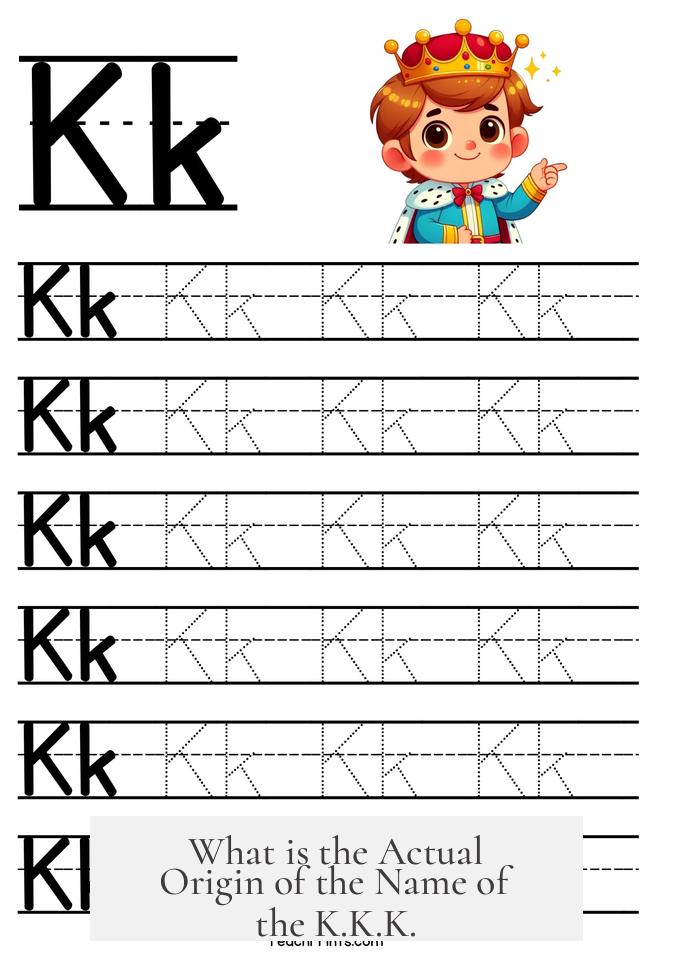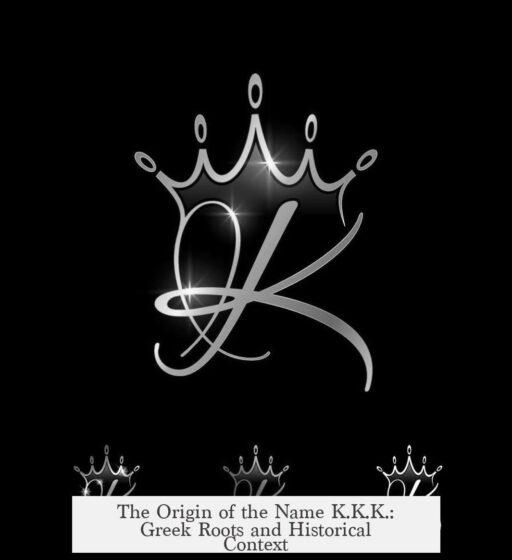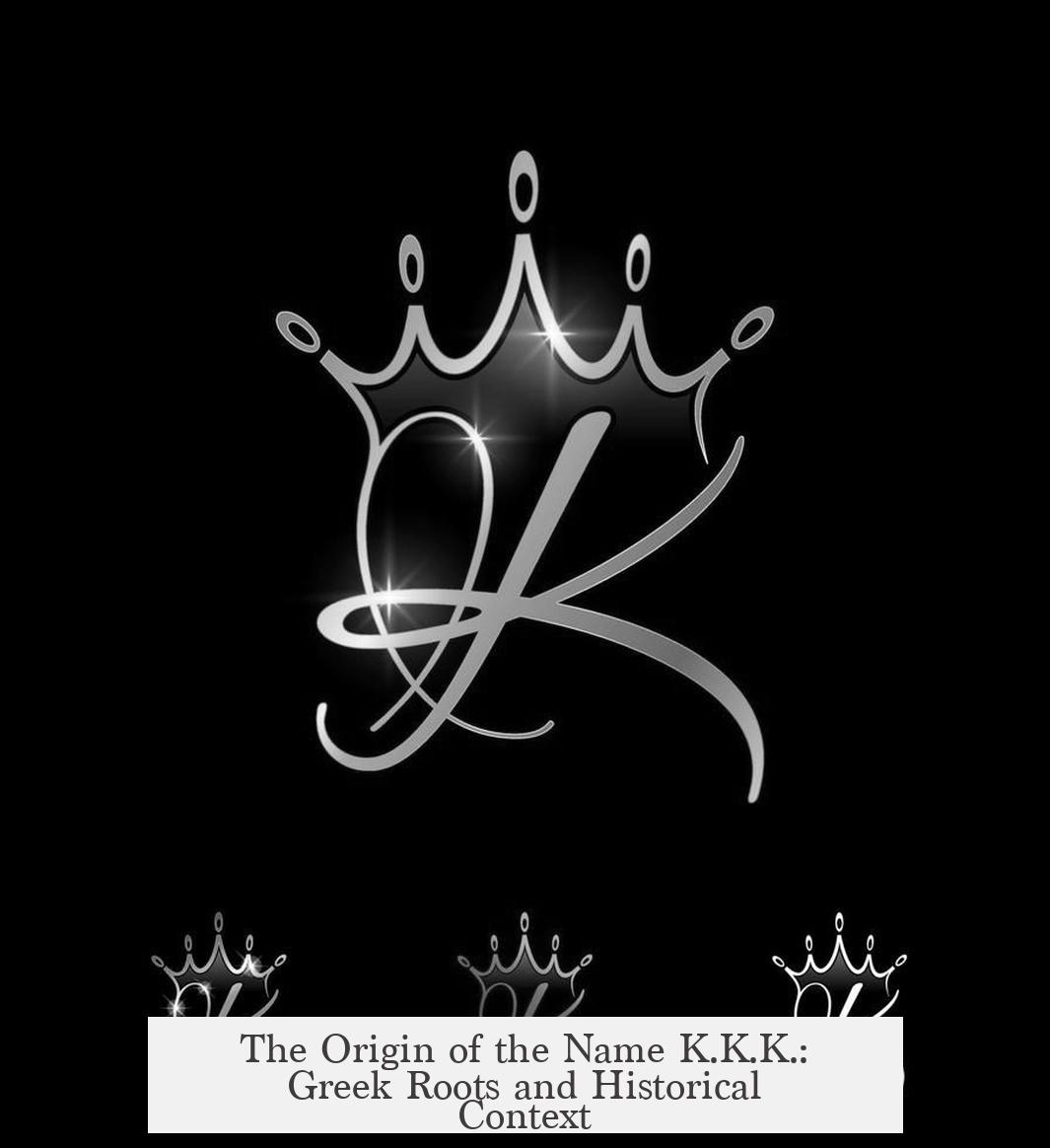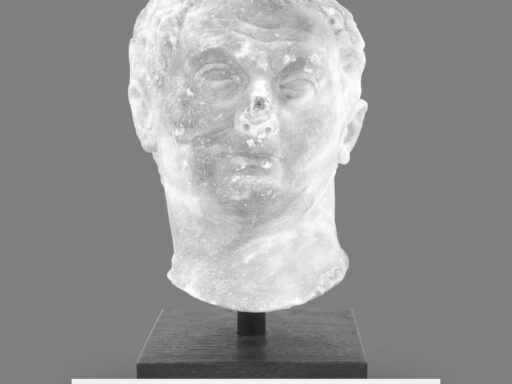The actual origin of the name of the K.K.K. comes from the Greek word “Kuklos,” meaning circle, which early founders adapted and altered to form “Ku Klux Klan.” This naming occurred during the group’s first meeting in 1866, held by six founding members: Frank O. McCord, Richard Reed, John C. Lester, Calvin Jones, John Booker Kennedy, and James Crowe. A committee consisting of Richard Reed and Calvin Jones was tasked with creating a name. They chose “Kuklos” to symbolize a circle, representing unity among members. This Greek term was gradually transformed into “Ku Klux,” with the addition of a third “K” suggested by John Kennedy, finalizing the moniker as Ku Klux Klan.
This origin story mainly derives from early members’ own accounts. James R. Crowe’s description is central: he notes McCord as Grand Cyclops and his own role as Grand Turk during the meeting. The group initially sought a meaningful name to reflect its character and purpose. According to Lester and D.L. Wilson, early Klansmen, the committee had difficulties finding a fitting name that expressed their aims. Several Greek-derived options, including “Kuklos” (meaning band or circle), were considered. Someone ultimately proposed “Ku Klux,” a phonetic variation lacking inherent meaning but offering a memorable sound. “Klan” was then appended to complete an alliterative and distinctive title.
Despite the source being self-reporting members, whose bias undoubtedly colors their narratives, the origin story is credible. Klansmen aimed to glorify themselves and downplay violent aspects, yet their explanation of the name aligns with the evidence on their social background and organizational style. The founders were social elites, many of whom attended college. Greek language knowledge was common, reflecting an intellectual self-image. The deliberate use of Greek adds weight to their claim about the name’s etymology.
The term “circle” held significance beyond mere symbolism. It echoed connections to pre-Civil War secret organizations such as the Knights of the Golden Circle, a pro-slavery group that promoted territorial expansion of the slaveholding South. Early Klan discourse directly compares their order to the Knights, suggesting ideological and cultural linkage. Their name’s structure and the choice of “circle” invoked this heritage, signaling both continuity and a shared commitment to similar racial and political goals.
Likewise, the Greek elements in Klan’s title tie into the broader cultural context of 19th-century fraternal organizations. Greek letters were commonly used by fraternities to create an air of sophistication and exclusivity. The Southern college fraternity Kuklos Adelphon, disbanded during the Civil War, bore a similar name, hinting at a possible influence or at least an ambient cultural source from which the Klan drew. Such use of Greek was typical of secret societies aiming to project cultured identities, underlining the founders’ elite self-perception.
The Klan further emulated the style of secret societies by adopting elaborate titles like “Grand Dragon” and “Grand Cyclops,” reinforcing the impression of a formal, ritualized group. This approach mirrored structures popular at the time, such as Freemasonry and the Sons of Malta. These borrowings established a recognizable framework for organization, while cloaking their aims and activities in mystery and grandeur. The nomenclature, therefore, was not accidental but part of a calculated image crafted by the founders.
| Key Aspect | Details |
|---|---|
| Origin Word | “Kuklos” (Greek for circle) |
| Name Evolution | Kuklos → Ku Klux → Ku Klux Klan |
| Founders | Frank O. McCord, Richard Reed, John C. Lester, Calvin Jones, John Booker Kennedy, James Crowe |
| Meaning | Initially meant circle, but “Ku Klux” itself has no direct meaning |
| Cultural Context | Linked to fraternal societies and Knights of the Golden Circle |
While historians regard Klan narrators as unreliable for broader historical interpretation, their explanation of the name shows consistency. It fits with the founders’ educational background, their elite social status, and their engagement with the period’s secret society culture. The use of Greek reinforces the notion that the Klan’s founders wanted to project refinement and discipline. Their choice echoes collegiate fraternity traditions and the symbolic use of “circle” from pro-Southern expansionist groups.
The name Ku Klux Klan embodies more than just identification; it reflects the social milieu and ideological lineage of a post-Civil War secret society intent on controlling and terrorizing African Americans and others through fraternal pageantry and ritual. The complex layering of language, symbolism, and organizational structure reveals that the Klan’s founders crafted a name designed to impress, intimidate, and connect with a pre-existing culture of exclusive societies.
- The name originates from Greek “Kuklos,” meaning circle, adapted by founding members.
- Early reports by founders explain the selection process and linguistic changes.
- The founders were college-educated elites familiar with Greek language and fraternities.
- The title reflects ties to earlier pro-slavery secret societies like Knights of the Golden Circle.
- The name’s form and the use of ritual titles link the Klan to 19th-century fraternal organizations.
What is the Actual Origin of the Name of the K.K.K.?

The name “Ku Klux Klan” originates from the Greek word kuklos, meaning “circle,” which was later altered and combined with “Klan” to give the organization its infamous name. But this crisp answer is just the tip of a far more tangled story about language, identity, secrecy, and social posture in post-Civil War America.
So, where does this circle come from, and why was it important enough to brand a vigilante group bent on terror? Let’s dive deep into the curious origins of this name and explore what it says about the Klan’s founders and their world.
The Founding Fathers and Their Greek Twist
The seeds of the Ku Klux Klan’s name were planted during a 1866 meeting in Pulaski, Tennessee. Attendees included Frank O. McCord, Richard Reed, John C. Lester, Calvin Jones, John Booker Kennedy, and James Crowe. Crowe’s account gives us the juicy behind-the-scenes moment where the name was born.
After McCord was voted Grand Cyclops and Crowe named Grand Turk—a hint at the theatrical flair of their intrigues—a committee formed to pick a name. This wasn’t just any committee. It included Reed and Jones, who were charged with delivering a title “suggestive of the character and objects of the society.” The word kuklos, Greek for “circle,” was their initial choice.
Quite cultured, don’t you think? I bet they felt pretty intellectual tossing around Greek words. And indeed, they were intellectuals—lawyers, publishers, college men, wealthy elites—educated enough to remember a bit of Greek from their studies. So the name reflected both a secret bond and a marker of social class.
From Kuklos to Ku Klux Klan: A Little Creative Naming
But here’s where the story gets weirdly amusing. When the word kuklos was proposed, someone apparently blurted out “Call it Ku Klux!” It doesn’t mean anything, really, just a twist on the Greek word that sounded ominous and quirkiest of all, a bit of alliteration with “Klan.”
John Kennedy is credited with suggesting the extra “K,” pushing the name to Ku Klux Klan. The addition of “Klan” (a quirky variation of “clan,” which means family or group) finished the alliterative effect. So instead of a straightforward Greek-derived name, they ended up with something almost nonsensical but catchy enough to stick.
Lester and D.L. Wilson, early Klansmen and historians of the group’s own mythology, confirm this origin, emphasizing how the name “Ku Klux Klan” was chosen more for the sound than meaning. An early society named Kuklos Adelphon (Brothers of the Circle), a Southern college fraternity disbanded during the Civil War, may have inspired the Greek usage. Could this be a case of borrowing to sound prestigious? Probably.
Symbolism and the Broader Social Context
This Greek origin fits neatly with the founders’ self-image. These men considered themselves social elites and intellectuals. The Greek word lent an air of classical sophistication and secrecy, hard to overlook. They wanted to look like a highbrow fraternity crossed with a secret society.
But the “circle” concept had another layer: a nod to the Knights of the Golden Circle. This earlier secret society pursued the expansion of slavery into the Caribbean, with “Circle” representing a slaveholding empire. The Klan’s use of circle imagery might have subtly aligned them with that militant vision. Early Klan mentions openly compared the two groups.
They weren’t just inventing random titles, either. Grand Cyclops, Grand Dragon, Grand Turk—all these names mirrored the rituals and grandiosity found in secret societies like the Masons and the Sons of Malta. The founders were steeped in a culture of fraternal organizations, and the name was part of fitting into that world.
Should We Trust Their Story?

Ah, here’s the tricky part: the storytellers are none other than the founders and first members themselves. These men shaped a narrative to glorify their group, sidestepping the terror tactics and racism to portray it as a noble defense of their “way of life.”
So, can we fully trust their origin tale? Probably not in the broader story, but in this specific case, historians see no glaring reason to doubt the naming explanation. The Greek derivation and fraternal roots make sense given who these men were and the social environment they operated in.
It fits perfectly with the cultural context: educated Southern gentlemen building a cloak-and-dagger identity steeped in classical language and secret rituals—despite the harsh realities underlying their cause.
Why Does This Matter Today?
Understanding the origin of the KKK’s name isn’t just academic nitpicking. It reveals how language and symbolism can be twisted to mask ugly intentions.
The founders sought to veil their violent, racist agenda with layers of classical sophistication and belonging to something “greater.” Their choice in name helped them cultivate a powerful image that attracted members and lulled outsiders into underestimating their menace.
Does knowledge of this Greek circle shed any light on the Klan’s enduring influence? Maybe. It highlights how secret societies cloak terrible motives in pomp, language, and pageantry, a trick still used by many nefarious groups.
Next time you hear “Ku Klux Klan,” remember it’s a name born from a classroom Greek lesson, a secret fraternity’s legacy, and a dark chapter in American history intertwined with symbolism and social aspiration.
Key Takeaways
- The KKK name comes from kuklos, Greek for “circle,” chosen by its founding members in 1866.
- The name was deliberately altered to “Ku Klux Klan” adding alliteration but losing explicit meaning.
- The founders were wealthy, educated men who wanted a cultured image tied to classical and fraternal traditions.
- The “circle” nod may refer to the pre-war Knights of the Golden Circle, hinting at ideological roots.
- The grandiose titles used reflect influence from contemporary secret societies.
- While founders aren’t reliable narrative sources, the name origin is widely accepted as accurate.
In revealing the layers beneath the Klan’s name, we unmask a carefully crafted image that tried to hide an ugly purpose. In history, names matter, and in this case, it’s a lesson in how sinister groups manipulate language to cloak their truths.




